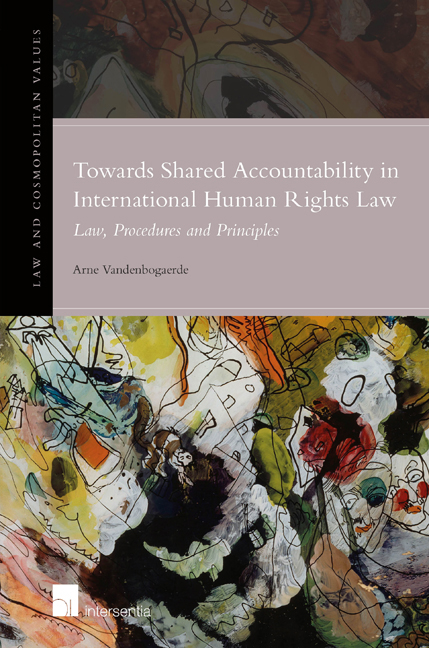Book contents
- Frontmatter
- Preface
- Acknowledgment
- Contents
- List of Abbreviations
- Chapter 1 Introduction
- PART I UNDERSTANDING ACCOUNTABILITY
- PART II ACCOUNTABILITY IN INTERNATIONAL AND REGIONAL HUMAN RIGHTS LAW: PROCESSES, PRACTICE AND LIMITS
- Chapter 3 State Reporting Procedures at the International and Regional Level
- Chapter 4 Individual, Collective and Inter-State Complaint Procedures in the International and Regional Accountability Framework
- Chapter 5 Inquiry Procedures in the International and Regional Accountability Framework
- Chapter 6 International Peer-Review Accountability Mechanisms
- Chapter 7 Special Procedures in the International and Regional Systems
- Conclusions Part II
- PART III CONTOURS OF A MULTI-DUTY BEARER FRAMEWORK
- Conclusion: Contours and Viability of A Multi-Duty-Bearer Framework
- Bibliography
- Law and Cosmopolitan Values
- Instructions to authors
Chapter 6 - International Peer-Review Accountability Mechanisms
from PART II - ACCOUNTABILITY IN INTERNATIONAL AND REGIONAL HUMAN RIGHTS LAW: PROCESSES, PRACTICE AND LIMITS
Published online by Cambridge University Press: 13 December 2017
- Frontmatter
- Preface
- Acknowledgment
- Contents
- List of Abbreviations
- Chapter 1 Introduction
- PART I UNDERSTANDING ACCOUNTABILITY
- PART II ACCOUNTABILITY IN INTERNATIONAL AND REGIONAL HUMAN RIGHTS LAW: PROCESSES, PRACTICE AND LIMITS
- Chapter 3 State Reporting Procedures at the International and Regional Level
- Chapter 4 Individual, Collective and Inter-State Complaint Procedures in the International and Regional Accountability Framework
- Chapter 5 Inquiry Procedures in the International and Regional Accountability Framework
- Chapter 6 International Peer-Review Accountability Mechanisms
- Chapter 7 Special Procedures in the International and Regional Systems
- Conclusions Part II
- PART III CONTOURS OF A MULTI-DUTY BEARER FRAMEWORK
- Conclusion: Contours and Viability of A Multi-Duty-Bearer Framework
- Bibliography
- Law and Cosmopolitan Values
- Instructions to authors
Summary
INTRODUCTION
The Universal Periodic Review or UPR could be called a ‘peer-review accountability mechanism'. In this accountability process States act as accountholders as well as duty-bearers. The UPR is a unique accountability mechanism: the regional human rights systems do not provide one. The African Union's (AU) African Peer Review Mechanism (APRM) is similar but much broader. The APRM was developed in 2002 in the framework of the New Partnership for Africa's Development (NEPAD). NEPAD is the AU policy framework on development for the African continent. NEPAD's main objectives, according to the participating AU heads of State, are ‘to eradicate poverty and to place our countries, individually and collectively, on a path of sustainable growth and development and, at the same time, to participate actively in the world economy and body politic on equal footing'. The APRM mechanism consists of a voluntary review by a State party to the APRM and by an international review team covering four governance areas: economic governance and management, democracy and political governance, corporate governance and socio-economic development. Human rights can thus certainly be addressed in this review but they are not its main focus.
THE UNIVERSAL PERIODIC REVIEW PROCESS OF THE HUMAN RIGHTS COUNCIL
The General Assembly (GA) established the Human Rights Council in 2006 as a subsidiary body through its resolution 60/251. The Human Rights Council, which replaced the former Commission on Human Rights, was instituted through the reform process of the UN human rights machinery and established in response to the criticism that the Commission on Human Rights had become too politicized. This critique still appears undeserved as the Commission on Human Rights was never meant to be an independent or apolitical body; it was supposed to be a political body. Owing to its composition, human rights issues of course were very easily politicized and mobilized in the interest of the State. The Human Rights Council is equally politicized; this is inevitable as it is an inter-governmental body, not an independent organ. The fear amongst many States and scholars was that the revision of the various procedures by the Human Rights Council would have a retrogressive effect. Indeed, notwithstanding the objective of improving whenever there is a revision of procedures, there is a risk of a weakening of the procedure.
- Type
- Chapter
- Information
- Towards Shared Accountability in International Human Rights LawLaw, Procedures and Principles, pp. 147 - 154Publisher: IntersentiaPrint publication year: 2016
- 1
- Cited by



